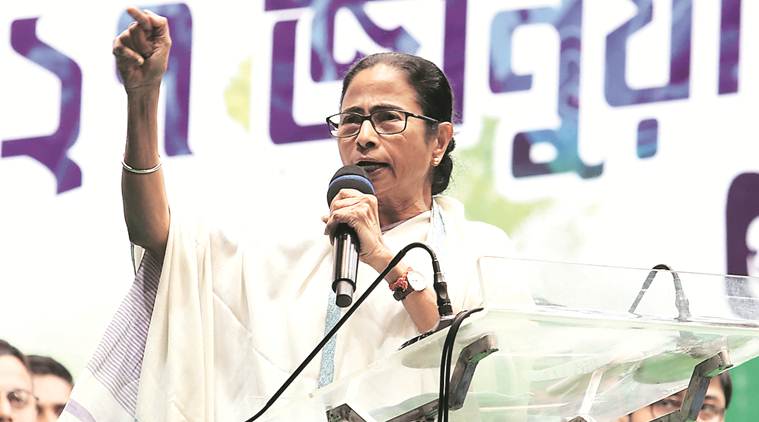 The government has allocated Rs 2.55 lakh crore for FY 2020-21 compared to Rs 2.38 lakh crore in FY 2019-20.
The government has allocated Rs 2.55 lakh crore for FY 2020-21 compared to Rs 2.38 lakh crore in FY 2019-20.
In its last full Budget, before West Bengal goes to polls early next year, the Mamata Banerjee-led Trinamool Congress government on Monday announced a slew of schemes, including giving free electricity to poor households – up to 75 units in three months. It also announced to set up 100 MSME (micro, small and medium enterprises) parks in the next three years to generate jobs in the state. From new pension schemes for senior citizens of Scheduled Castes and Schedules Tribes, and social security scheme for workers in the unorganised sector, the government also announced assistance scheme for unemployed, tea garden workers.
Presenting the Budget, which has an outlay of Rs 2,55,677 crore with limited deficit of only Rs 8 crore, state Finance Minister Amit Mitra said Rs 5,150 crore has been allocated for the next financial year towards these schemes.
Under the ‘Hasir Alo’ scheme, no electricity charge will be levied on domestic consumers whose quarterly power consumption is up to 75 units. “This will benefit 35 lakh poor families,” Mitra said, adding that Rs 200 crore has been allocated to meet the free power expenses.
To give a fresh impetus to employment generation, the Finance Minister said that the government will allocate Rs 200 crore for setting up 100 MSME parks in the state. “As per the NSSO report of the Central government, West Bengal has 88.67 lakh MSME establishments. During the last eight years, the number of MSME clusters in operation has grown from 49 to 539… At present, 52 MSME parks are operating and 39 more such parks are under construction,” Mitra said, adding that the government has given special focus on the MSMEs as they provide maximum employment. He also announced a new incentive scheme, “Banglashree Prakalpa”, under which MSME that began operations from April 1, 2019, will be eligible for the scheme.
The government also announced pension schemes ‘Bandhu Prakalpa’ and ‘Jai Johar Prakalpa’ for Scheduled Castes (SC) and Scheduled Tribes (STs), respectively, under which senior citizens, above 60 years, will be given a monthly pension of Rs 1,000 per on the condition that they are not covered under any other pension scheme. Mitra said that the scheme would benefit 21 lakh senior SC citizens and 4 lakh senior ST citizens.
Another highlight in the Budget was the state government’s decision to waive agricultural income tax for tea gardens workers for the next two financial years – 2020-21 and 2021-22. It also announced housing in the tea garden land for tea garden workers. “Considering the gravity of the present situation in tea gardens in the state, I propose to waive the agricultural income tax to the tea gardens for the next two financial years 2020-21 and 2021-22,” Mitra said in his speech.
He also announced to set up three new universities, and free social security scheme for the unorganised sector.
In his speech, Mitra claimed that while the country is going down on various economic indices, West Bengal is surging forward in terms of GSDP growth and on other yardsticks, adding that in the current financial year, the state has been able to generate 9.11 lakh employment opportunities.
The government has allocated Rs 2.55 lakh crore for FY 2020-21 compared to Rs 2.38 lakh crore in FY 2019-20. For 2020-21, the state government has projected tax revenue receipts of Rs 70,807 crore against the revised estimate of Rs 65,806 crore in 2019-20. The government has also proposed dispute settlement schemes with respect to VAT, CST, entry tax, settlement of disputes under Motor Vehicles Act, waiver of interest on outstanding stamp duty and reduction of stamp duty on an amalgamation of adjacent plots.
According to Mitra, under the settlement scheme introduced in December 2019, nearly Rs 1,200 crore could be collected, benefitting some 30,000 taxpayers. “It is often observed that amalgamation of adjacent plots of land is required, especially in cases of family property. The present stamp duty of 5 per cent to 7 per cent is imposed on such transaction. I propose to reduce the stamp duty in such cases from 5 to 7 per cent to nominal 0.5 per cent with the ceiling of Rs 3,00,000,” Mitra said.
Later, addressing a post-Budget press conference along with Mitra, Chief Minister Mamata Banerjee hailed it as a “pro-people budget” prepared keeping in mind all sections of the people.